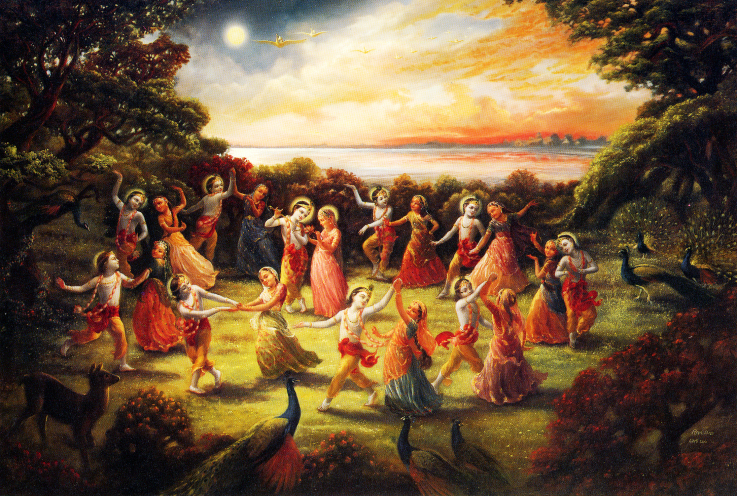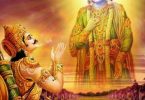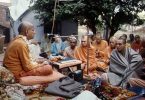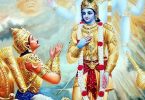Question: On the platform of prema, all anarthas are eradicated. How are we to understand the statement that the gopis had pride when dancing with Krsna in the rasa dance, and thus He left them?
Answer by Romapada Swami:
“garva (pride) arose from mature prema, because of the desire of his līlā–śakti, and because of his desire to give all of them the highest rasa.” See Jiva Goswami’s commentary, below.
|| SB 10.29.47 ||
evaà bhagavataù kåñëäl labdha-mänä mahätmanaù ätmänaà menire stréëäà mäninyo hy adhikaà bhuvi
The gopés became proud of themselves for having received such special attention from Kåñëa, the Supreme Personality of Godhead, and each of them thought herself the best woman on earth.
VCT Commentary:
Because of being able to enjoy intimately with Him, each gopé became proud (mäninyo) thinking, “I am the most fortunate woman on the surface of the earth.”
Jiva Goswami:
The gopīs were respected by Kṛṣṇa because they controlled him with prema. Being fortunate, they felt confident. They each thought that among all the women everywhere and at that place, they were the best. They felt confident of Kṛṣṇa and felt pride in comparison to other women.
Each felt proud because no one else in the world had attained a hero like Kṛṣṇa, and no gopī on the bank of the Yamunā had attained such great fortune as themselves. saubhāgya-rūpa-tāruṇya-guṇa-sarvottamāśrayaiḥ | iṣṭa-lābhādinā cānya-helanaṁ garva īryate || “Treating others with contempt due to one’s own good fortune, due to youthful beauty, due to one’s good qualities, due to taking shelter of the Lord, or due to attaining one’s object of love, is called garva or haughtiness.” BRS 2.4.41
sañcārayanti bhāvasya gatiṁ sañcāriṇo ’pi || unmajjanti nimajjanti sthāyiny amṛta-vāridhau | Since they set in motion (sañcārayanti) the course of the sthāyibhāva, they are called sancāri-bhāvas. All the vyabhicāri-bhāvas rise and fall like waves in the sweet ocean of the sthāyi-bhāva, BRS 2.4.1-2 Pride is the sancāri-bhāva of the sthāyi-bhāva, their special prema (madhura-rasa). It sustains and gives excellence to rasa.
BBT:
The gopés were proud because they had attained as their lover the greatest of all personalities. So in a sense they were proud of Kåñëa. Also, the pride of the gopés was a pretense created by Kåñëa’s pastime potency in order to intensify their love for Him through separation.
Jiva Goswami Tosani Commentary – 10.29.48
He saw particularly (vīkṣya) their pride because of their good fortune.
Mada means semen, musk, pride (garva) and transformation due to joy according to Viśva-prakāśa.
He thought that the pride (garva) could not be removed by reasoning and that the māna could not be removed by conciliation. To relieve them of garva and sooth their māna, he disappeared.
The form of the verb conjugated as the fourth class of verb, expresses disrespect (antardīyate). He did not go somewhere else where he could be seen. As will be explained later, he disappeared along with Śrī Rādhā. By his desire this was accomplished by yogamāyā.
For relieving a person of māna arising from envy, the hero sometimes shows disrespect: hetur yas tu śamaṁ yathāyogyaṁ prakalpitaiḥ | sāma-bheda-kriyā-dāna-naty-upekṣā-rasāntaraiḥ || “Anger with a cause is destroyed suitably by use of sāma (pacification), bheda (division), kriyā (action), nati (offering respects), upekṣā (disrespect) and rasāntara (change of rasa).” Ujjvala-nīlamaṇi 15.112
However causeless māna has no remedy or very little remedy. In this case Kṛṣṇa showed disrespect by disappearing in order to relieve them of māna since it was deeply embedded with garva. Thus he disappeared in order to relieve them of garva and māna.
He had a desire to dissipate both garva (pride) and māna, though they arose from mature prema, because of the desire of his līlā–śakti, and because of his desire to give all of them the highest rasa.







